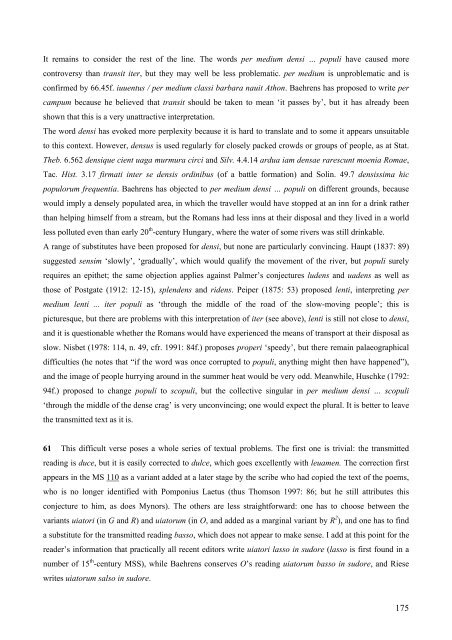CATULLUS 68 - Scuola Normale Superiore
CATULLUS 68 - Scuola Normale Superiore
CATULLUS 68 - Scuola Normale Superiore
You also want an ePaper? Increase the reach of your titles
YUMPU automatically turns print PDFs into web optimized ePapers that Google loves.
It remains to consider the rest of the line. The words per medium densi … populi have caused more<br />
controversy than transit iter, but they may well be less problematic. per medium is unproblematic and is<br />
confirmed by 66.45f. iuuentus / per medium classi barbara nauit Athon. Baehrens has proposed to write per<br />
campum because he believed that transit should be taken to mean ‘it passes by’, but it has already been<br />
shown that this is a very unattractive interpretation.<br />
The word densi has evoked more perplexity because it is hard to translate and to some it appears unsuitable<br />
to this context. However, densus is used regularly for closely packed crowds or groups of people, as at Stat.<br />
Theb. 6.562 densique cient uaga murmura circi and Silv. 4.4.14 ardua iam densae rarescunt moenia Romae,<br />
Tac. Hist. 3.17 firmati inter se densis ordinibus (of a battle formation) and Solin. 49.7 densissima hic<br />
populorum frequentia. Baehrens has objected to per medium densi … populi on different grounds, because<br />
would imply a densely populated area, in which the traveller would have stopped at an inn for a drink rather<br />
than helping himself from a stream, but the Romans had less inns at their disposal and they lived in a world<br />
less polluted even than early 20 th -century Hungary, where the water of some rivers was still drinkable.<br />
A range of substitutes have been proposed for densi, but none are particularly convincing. Haupt (1837: 89)<br />
suggested sensim ‘slowly’, ‘gradually’, which would qualify the movement of the river, but populi surely<br />
requires an epithet; the same objection applies against Palmer’s conjectures ludens and uadens as well as<br />
those of Postgate (1912: 12-15), splendens and ridens. Peiper (1875: 53) proposed lenti, interpreting per<br />
medium lenti ... iter populi as ‘through the middle of the road of the slow-moving people’; this is<br />
picturesque, but there are problems with this interpretation of iter (see above), lenti is still not close to densi,<br />
and it is questionable whether the Romans would have experienced the means of transport at their disposal as<br />
slow. Nisbet (1978: 114, n. 49, cfr. 1991: 84f.) proposes properi ‘speedy’, but there remain palaeographical<br />
difficulties (he notes that “if the word was once corrupted to populi, anything might then have happened”),<br />
and the image of people hurrying around in the summer heat would be very odd. Meanwhile, Huschke (1792:<br />
94f.) proposed to change populi to scopuli, but the collective singular in per medium densi … scopuli<br />
‘through the middle of the dense crag’ is very unconvincing; one would expect the plural. It is better to leave<br />
the transmitted text as it is.<br />
61 This difficult verse poses a whole series of textual problems. The first one is trivial: the transmitted<br />
reading is duce, but it is easily corrected to dulce, which goes excellently with leuamen. The correction first<br />
appears in the MS 110 as a variant added at a later stage by the scribe who had copied the text of the poems,<br />
who is no longer identified with Pomponius Laetus (thus Thomson 1997: 86; but he still attributes this<br />
conjecture to him, as does Mynors). The others are less straightforward: one has to choose between the<br />
variants uiatori (in G and R) and uiatorum (in O, and added as a marginal variant by R 2 ), and one has to find<br />
a substitute for the transmitted reading basso, which does not appear to make sense. I add at this point for the<br />
reader’s information that practically all recent editors write uiatori lasso in sudore (lasso is first found in a<br />
number of 15 th -century MSS), while Baehrens conserves O’s reading uiatorum basso in sudore, and Riese<br />
writes uiatorum salso in sudore.<br />
175






